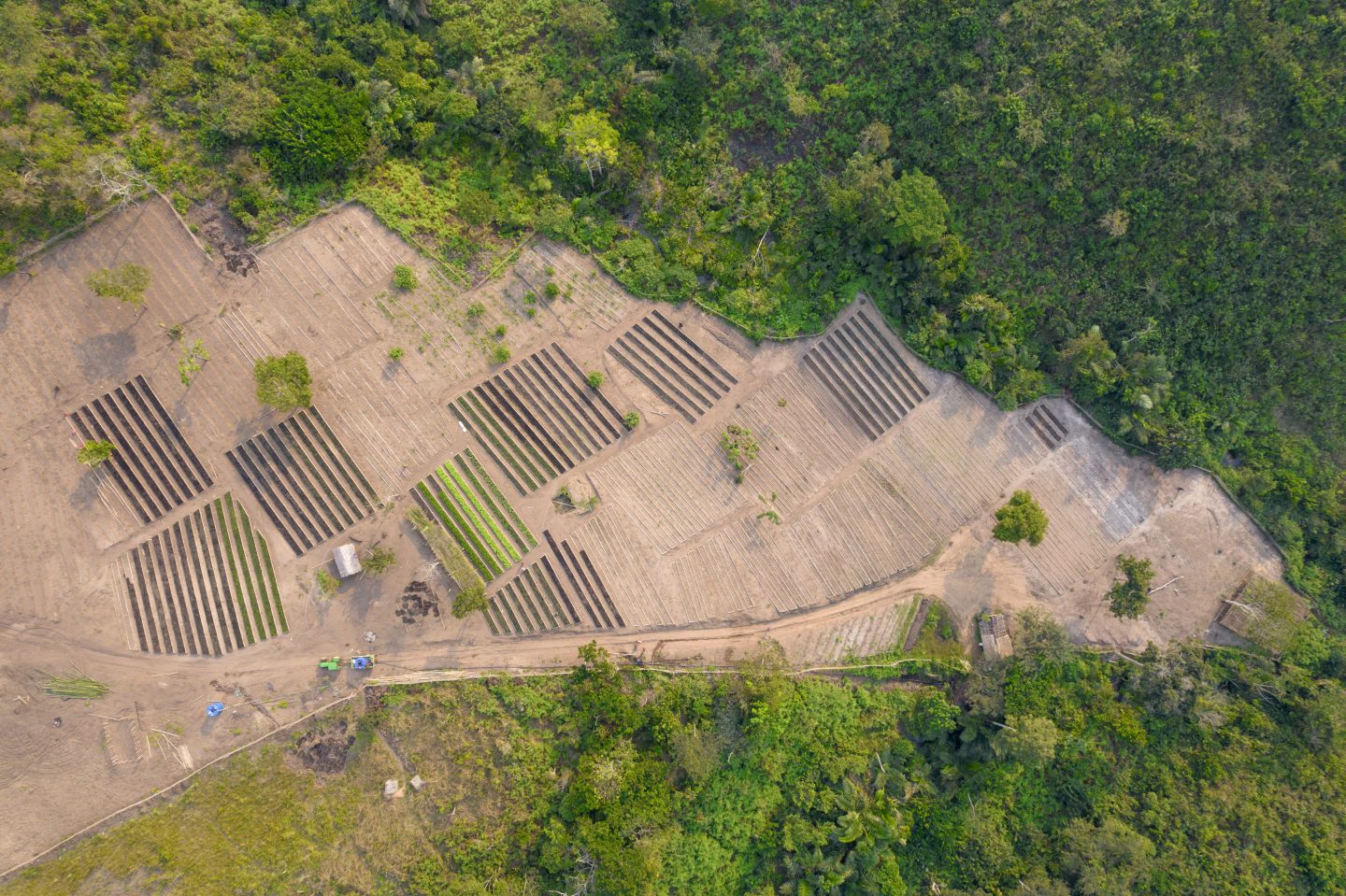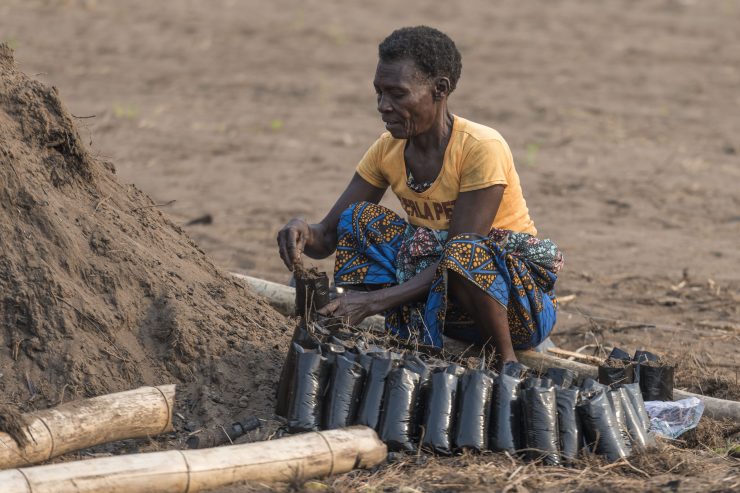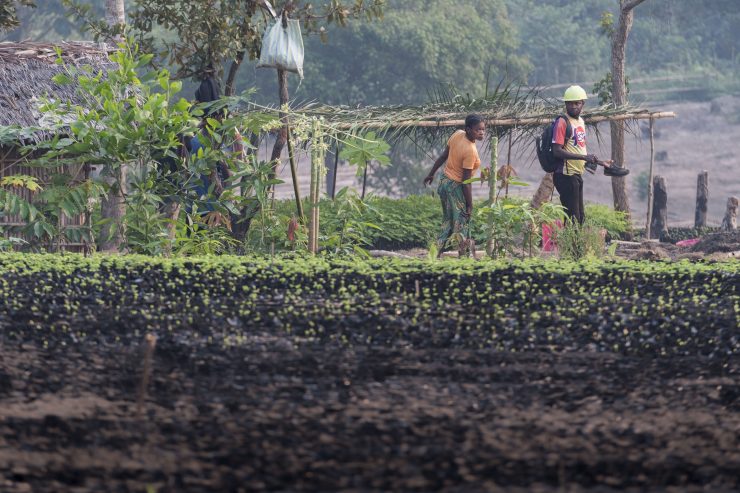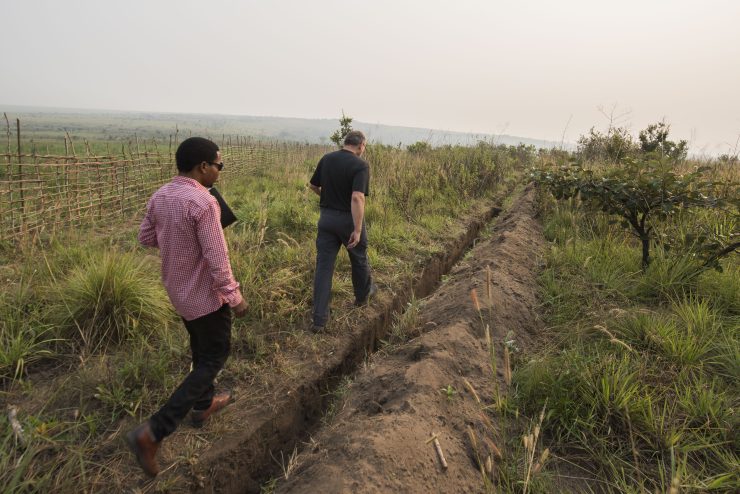Almost two years ago, Colruyt Group announced an ambitious project in the Democratic Republic of Congo (DRC): the planting of 10,000 hectares of forest, which equates to over 12 million trees. The goal for this project is to offset 120,000 tons of CO₂ per year by 2030 and move towards net-zero emissions. Belgian family-owned businesses Duvel Moortgat and Lotus Bakeries are now also joining this project. The involvement of Duvel and Lotus Bakeries will result in active collaborations with suppliers contributing to increasing natural CO₂ storage outside the value chain, as well as investments in various social, economic, and ecological initiatives for the local community.

Duvel Moortgat and Lotus Bakeries join Colruyt Group’s tree project in the Democratic Republic of Congo
Three Belgian family-owned businesses with the same belief in a socially relevant project
Colruyt Group has been committed to reducing CO₂ emissions for many years through various initiatives, such as investing in energy-efficient buildings and zero-emission goods mobility. In September 2022, however, Colruyt Group embarked on a new and ambitious plan in the Democratic Republic of Congo (DRC). Colruyt Group intends to plant 10,000 hectares of forest – over 12 million trees – in the Kwango region. With this project, Colruyt Group is aiming to offset and compensate for the equivalent of its direct CO₂ emissions that cannot be reduced. The ambition is to capture 120,000 tons of CO₂ per year by 2030 and move towards net-zero emissions. After nearly two years of knowledge building with the local population and planting over 4.2 million trees, the project is now delighted to welcome the involvement of Belgian family-owned businesses Duvel Moortgat and Lotus Bakeries. Specifically, Duvel and Lotus Bakeries will invest in Colruyt Group’s entire project, including tree planting and social initiatives.
Compensating for scope 1, 2, and 3 emissions together
Involving suppliers and other links in the chain is essential for Colruyt Group’s sustainability strategy, as suppliers are part of the indirect emissions, which Colruyt Group has committed to reducing. For example, Danone recently joined the Eco-score initiative, and Colruyt Group’s zero-emission transport ambition will also rely on partner engagement. Stefan Goethaert, CEO of Colruyt Group, explains “Sustainability is a complex issue, and we see it as an important condition to fulfill our ambitions together with our partners. We want to take a leading role in this and actively involve our partners. This is the only way we can create sustainable added value throughout the entire chain in the long term.”
Duvel, like Colruyt Group, is actively working on reducing its carbon footprint. CEO Michel Moortgat explains how this project aligns with the company’s vision. “Over the coming years, Duvel Moortgat will continue to invest in projects that reduce emissions throughout our entire value chain, from raw materials at the farm to the beer consumed by customers.” Duvel Moortgat is continuously investing, for example, in the generation of renewable energy, both electricity and heat, needed in the brewing process. The company also employs innovative technologies that maximise the reuse of glass bottles. Recognising the significant impact of beer packaging on emissions, Duvel Moortgat recently invested heavily in purchasing lighter-weight glass bottles, which have a lower environmental impact.
“Achieving global reduction targets in the medium and long term is absolutely necessary but will not be enough to limit global warming to 1.5°C. Reducing absolute emissions within our own value chain remains a priority but needs to be complemented by investments that support the global ecosystem. That’s why we also want to focus on scaling up initiatives that reduce and compensate for emissions outside our own value chain in the long term. Only through this dual approach will companies contribute to limiting global warming to 1.5°C and fulfil their role in achieving a global net-zero economy. I strongly believe that companies need to collaborate to achieve this goal. I am therefore delighted to be joining forces with another well-established, Belgian family-run business for this project,” concludes Moortgat.
Jan Boone, CEO of Lotus Bakeries, adds, “I am particularly enthusiastic about Colruyt’s ambitious tree project in the Democratic Republic of Congo and grateful for the opportunity to collaborate. Only by working together with like-minded partners can we reduce emissions across the entire value chain. Lotus Bakeries has been committed to several ambitious sustainability priorities for many years. One of our key environmental focuses is our aim to make all packaging recyclable by 2025. Over 97% of our packaging was already technically recyclable at the end of 2022. And, in addition to its packaging ambitions, Lotus Bakeries has also signed the Science Based Targets Initiative’s Business Ambition for 1.5°C pledge, committing to the goal of net-zero greenhouse gas emissions across the entire supply chain by 2050. The tree project in the Democratic Republic of Congo aligns with this ambition. It is absolutely crucial to collaborate within the value chain to both reduce and compensate emissions. We are very excited to embark upon this journey together with an important client, and for the long term. The project is a strong addition to the existing emission reduction initiatives within our own organisation.”
Actively involving local people
The socio-economic aspect of the tree project was a major motivating factor for Duvel and Lotus Bakeries to join. Currently – together with the local population – over four million trees have already been planted on 3,500 hectares, equivalent to the size of nearly 17,000 Colruyt stores. The project is progressing according to plan and relies on the support of the Kwango region, as the key partners in the project are undoubtedly the local communities. Stefan Goethaert explains, “The involvement of the local population is essential. The added value needs to be clear and tangible for them as well. The primary goal of this tree project is to plant a forest and, above all, protect it. And that’s what we’re doing together with the local communities. We’re also jointly installing various infrastructure to facilitate the residents’ daily activities, and stimulating the local economy together through various initiatives.”
Besides reforestation, the emphasis is also on agricultural production. Local farmers use their expertise to grow, for example, corn, cassava, nuts and beans on the land surrounding the forest. Here too, there is a strong focus on knowledge sharing, where Colruyt Group supports, among other things, the cultivation of the land. The ultimate goal is to set up a value chain in the future and bring farmers' locally grown products to the wider market. "We believe that this project is the right way to do CO2 capture on the one hand, while at the same time building a meaningful project for the local population. We are delighted that our suppliers share this belief and are now co-investing in this valuable story," concludes Stefan Goethaert.


